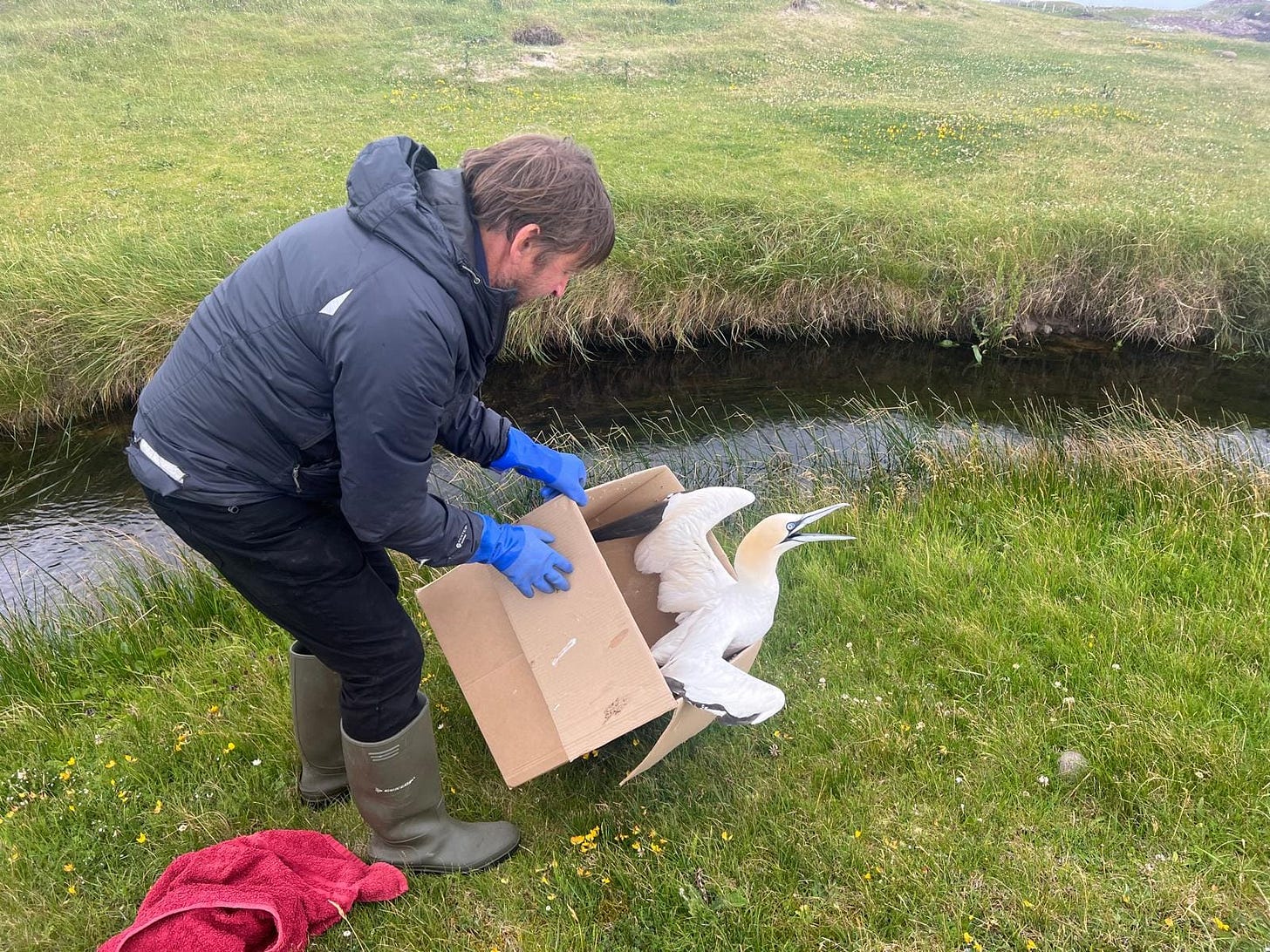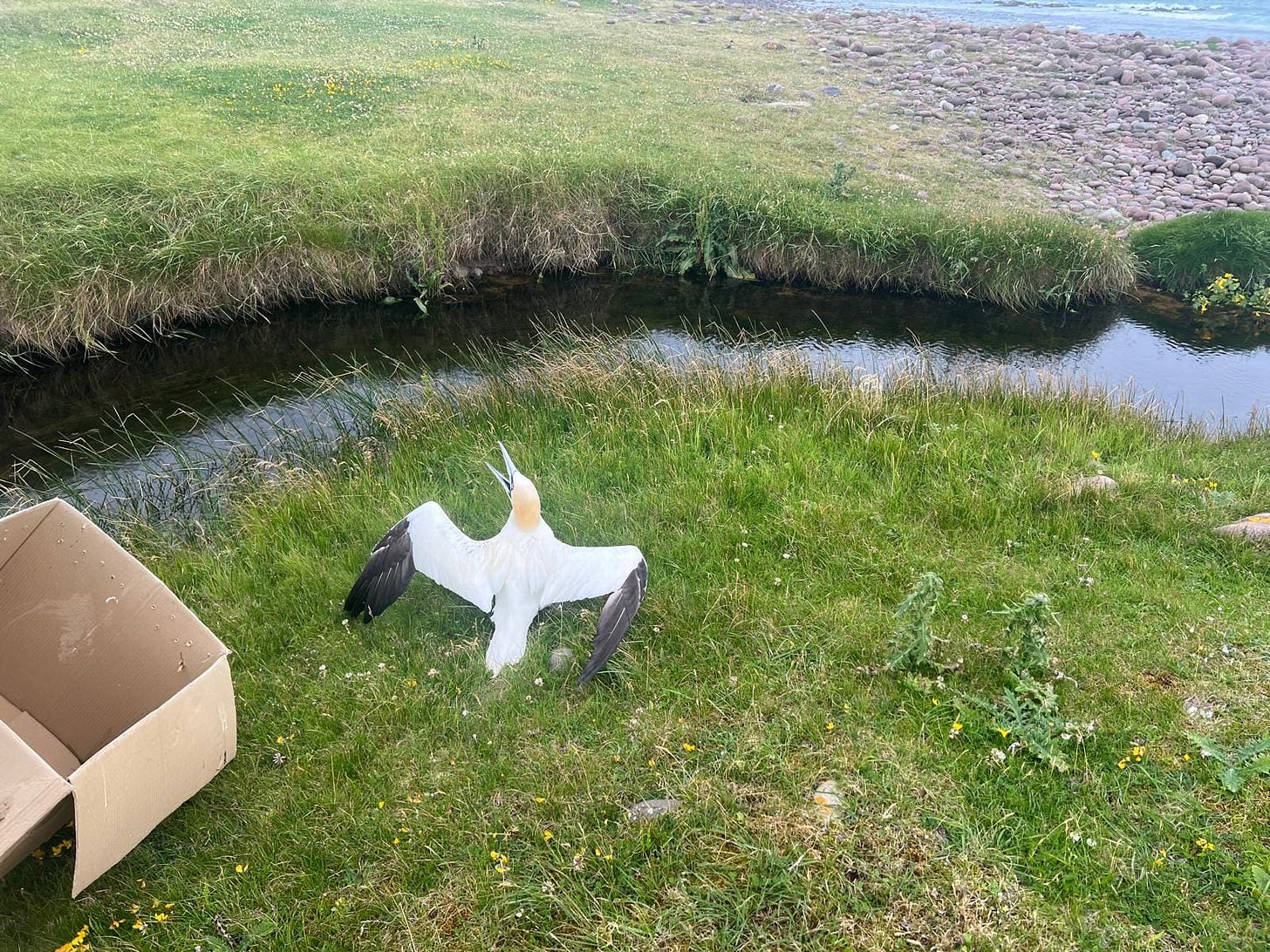Blown Off Course: An Unexpected Visit
Andy helps a stranded Gannet find its way back out to sea
Early one June morning in 2024, as the mist began to burn off the Assynt coastline, an unusual call came into the Ranger Service. A concerned local had spotted a gannet—a seabird that typically spends most of its life at sea—sitting forlornly by the roadside in Lochinver. This rare sighting immediately raised alarm bells.
With the echoes of the call still fresh in our minds, we set off to investigate. Our hearts were heavy with apprehension; it is not normal for a gannet to be so far inland, and we feared the worst—perhaps the bird was a victim of the dreaded bird flu that had been ravaging seabird populations.
Gannets, known scientifically as Morus bassanus, are remarkable birds. Their striking white plumage, salmon pink head, black-tipped wings, and long, pointed beaks make them easy to identify. With a wingspan of up to two metres, they are powerful and agile fliers, capable of diving from heights of up to 30 metres to catch fish—their primary diet. These birds spend most of their lives at sea, coming ashore only to breed on remote rocky cliffs and islands, where they form large, bustling colonies.
Equipped with protective gear to guard against any potential infection, I approached the scene cautiously. However, as I got closer, my concern began to ease. There, by the side of the road, was a surprisingly feisty gannet. Its eyes were bright, and it moved with the energy of a bird in good health. There were no signs of injury, and it appeared to be at a healthy weight. Relief washed over us as we realised that this gannet was not sick, just disoriented.
Strong early summer winds had likely blown it off course, leaving it confused and far from its natural ocean habitat. Though known for powerful flight, even these magnificent birds can be thrown off by the capricious forces of nature.

Securing the gannet was the next step. With gentle hands and reassuring murmurs, we carefully placed the bird into a carrier. Its protest was spirited but brief, as if it, too, sensed that we were there to help.
The drive to the coast felt unusually long, the air filled with a mixture of nervous anticipation and hope. Finally, we reached a spot where the ocean stretched out before us, a vast, welcoming expanse. As we opened the carrier, the gannet seemed to understand that it was home.
After being released it hesitated for just a moment to get its bearings, then spread its impressive wings wide. With a powerful beat, it took to the sky, soaring over the waves and back to the life it knew so well. Watching it disappear into the horizon, we felt a deep sense of satisfaction. The rescue was complete, and the gannet was back where it belonged.
These seabirds are fascinating creatures. Gannets are monogamous, often forming lifelong pairs. They nest in large colonies on cliffs and rocky islands, where they lay a single egg each year. Both parents share the duties of incubating the egg and feeding the chick, which fledges after about 13 weeks.
Their dramatic courtship displays include mutual preening and the iconic “sky-pointing” pose, where they stretch their necks and beaks towards the sky.

This successful rescue reminded us of the delicate balance of nature and the importance of expert handling in such situations. We strongly advise the public against approaching or touching seemingly sick seabirds due to the risk of bird flu. In this instance, we were fortunate to witness a positive outcome, but it’s always best to leave wildlife handling to the professionals to prevent injury.
As the day ended, I felt a sense of accomplishment, knowing I had played a part in restoring the natural order, even in this small way.
Andy Summers, North Highland's Senior Ranger for High Life Highland, is a dedicated naturalist with a deep understanding of the region's diverse ecosystems. His extensive experience in wildlife conservation and passion for preserving North Highland's pristine landscapes make him a vital asset. Andy's work encompasses wildlife observation, environmental education, and passing on a greater appreciation for the area's unique flora and fauna. His commitment to conserving North Highland's natural heritage is evident in his expertise and unwavering dedication.









What a great story! So glad you managed to rescue this gannet, they're such magnificent birds